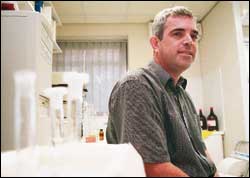Two more genes found in sporting puzzle
27 March 2006
New pieces: Dr Malcolm Collins and his team have discovered two more genes they believe have a role to play in athletic prowess.
It's, like, the holy grail of sports science. (And maybe also the dread of those who fear a Gattaca-like future.) Scientists have long held that athletic ability comes from more than just 20 push-ups in the morning and eating your veggies. And in this the age where the Human Genome Project has become a household name - even if we don't sometimes get what the fuss is all about - it's no surprise then that they've turned to the Petri dish for answers. "There are certain things that we can do to improve our athletic performance, like train properly and eat properly," says Dr Malcolm Collins of the Medical Research Council (MRC)/UCT Research Unit for Exercise Science and Sports Medicine (ESSM). "But there are also certain things we're just born with." Genes. Now Collins and colleagues at UCT, the Cyprus Institute of Neurology and Genetics as well as the Cardiovascular Diagnostic Centre, also in Cyprus, believe they've identified two more genes that can explain the "raw talent" of some endurance athletes. In their study on competitors in the 2000 and 2001 South African Ironman Triathlons, the group has found that the bradykinin ß2 receptor (BDKRB2) and the nitric oxide synthase 3 (NOS3) genes are associated with athletic performance. Meaning that a higher proportion of competitors have the genes than, say, the general population. (Another recent overseas study also picked up on the BDKRB2, but not the NOS3.) More than that, Collins' team also observed an interaction between the two genes, a never-before identified phenomenon. And in another first, the scientists built a model around this interaction - throwing in variables like age and weight - to predict individual athletes' performance. Their conclusion? BDKRB2 and NOS3 play their parts. But don't start calling for genetic tests to sort the hares from the tortoises just yet, cautions Collins. Genes may not be the only things that make a podium finisher. "It's a big puzzle, and we're just identifying single pieces of the puzzle," he says. There's hope for us slouches yet.
 This work is licensed under a Creative Commons Attribution-NoDerivatives 4.0 International License.
This work is licensed under a Creative Commons Attribution-NoDerivatives 4.0 International License.
Please view the republishing articles page for more information.










